May 28, 2025 | 23:10 GMT +7
May 28, 2025 | 23:10 GMT +7
Hotline: 0913.378.918
May 28, 2025 | 23:10 GMT +7
Hotline: 0913.378.918
On July 4, the National Agriculture Extension Center (NAEC), and the Japan International Cooperation Agency (JICA) jointly held a conference to share experience and best practices from the project "Strengthening Safe Crop Value Chain in Northern Vietnam".
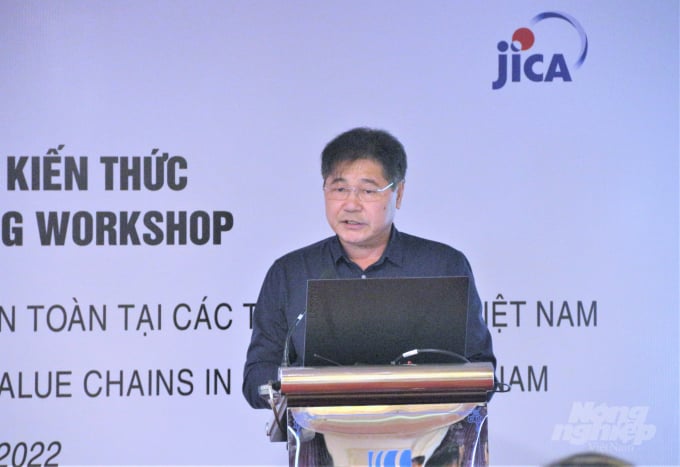
According Mr.Le Quoc Thanh (NAEC), the project will have an impact on Vietnam's fruit & vegetable value chains. Photo: Pham Hieu.
According to Le Quoc Thanh, Director of the National Agriculture Extension Center, the Government and the Ministry of Agriculture and Rural Development (MARD) have currently attached great importance to standards and certifications in food production, value chain promotion, especially in fruit and vegetable production to keep up with the requirements from different markets both domestic and international.
Accordingly, following two projects including "Increasing crop production management capacity in Vietnam" and "Increasing the credibility of safe crop production in Northern Vietnam", the project "Strengthening Safe Crop Value Chain in Northern Vietnam" will be deployed in seven provinces and cities including Hanoi, Ha Nam, Hung Yen, Hai Duong, Bac Ninh, Nam Dinh and Son La. Japan's ODA grants US$3 million for the project which will be implemented within four years, from 2022 until 2026.
The aim of the project is to promote and to build human resources capacity to scale up safe crop production; increasing production and management capacity in cooperatives that produce safe crops; promoting partnerships among stakeholders in the value chains and increasing capacity of implementing food safety regulations.
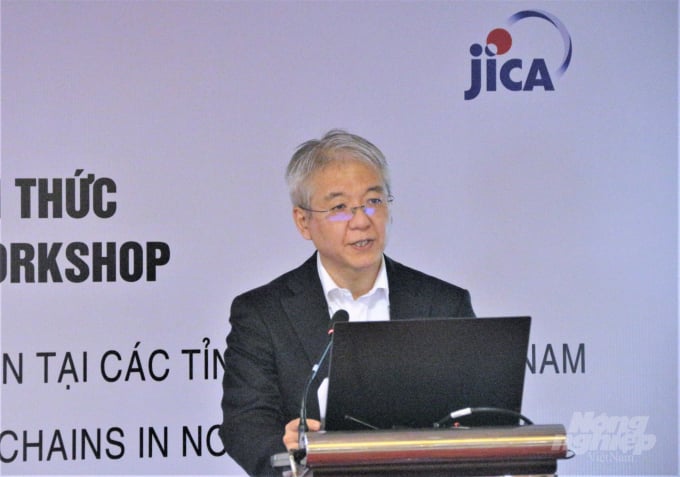
Mr.Murooka Naomichi, Deputy Chief Representative of JICA Office in Vietnam is speaking at the conference. Photo: Pham Hieu.
Mr. Le Quoc Thanh assessed that the project would have a great impact on Vietnam's fruit and vegetable production chain and it would open up the opportunity for Vietnamese fruits and vegetables to access to highly-demanding markets.
Mr.Murooka Naomichi, Deputy Chief Representative of JICA Office in Vietnam expects the project will receive the attention of local governments to be implemented smoothly and effectively, bringing benefits to both farmers and cooperatives.
Mr. Murooka Naomichi also hopes that the project will contribute a part to strategy and policy development of the localities that are chosen for implementing the project.
As a large vegetable producer in My Duc district (Hung Yen province), Yen Phu Agricultural Service Cooperative has 30 hectares of vegetables certificated with VietGAP. With about 8 tons of vegetables produced and sold every day, Yen Phu cooperative is a stable source of greens for supermarkets and retail chains such as Coopmart, Aeon Vietnam, Winmart.
Speaking at the conference, the representative of Yen Phu cooperative said since participating in the project " Strengthening Safe Crop Value Chain in Northern Vietnam", the members of the cooperative have improved the capacity of producing safe and high-quality vegetables and their products are now qualified for putting up for sale on potential markets.
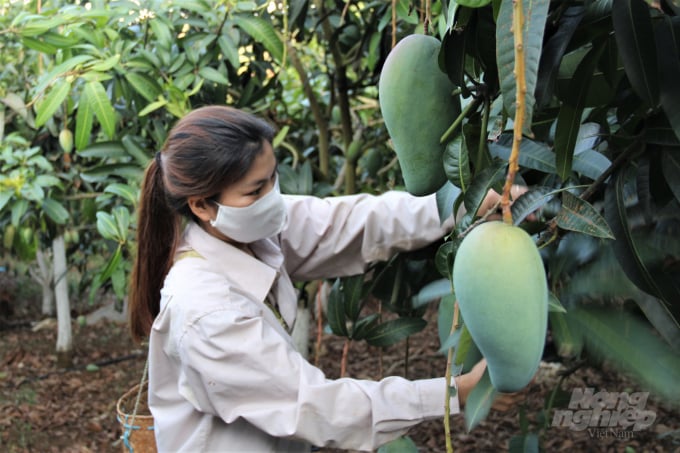
The aim of the project is to build human resources capacity to scale up safe crop production. Photo: Pham Hieu.
Particularly, Yen Phu cooperative's member worked together to set up a concentrated sale model. Thanks to that, their vegetables have been sold for prices 10-25% above the market. In addition, the cooperative has created regular jobs for its members with the average monthly wage of VND4 million-VND10 million.
Regarding market access and expansion, before the project, Yen Phu cooperative sold 300-500kg of vegetables per day to local traders for the prices 5% lower compared to the prices in wholesale markets.
Since they participated in the project, their vegetables have now been put up for sale at supermarkets and retail chains. They can sell around 8 tons of vegetable on average and the prices are now 20-30% higher compared to the prices in the wholesale markets.
According to the representative of Yen Phu cooperative, when the concentrated sales model was first introduced to its members, it faced numerous difficulties, especially lacking in product management and food control experience.
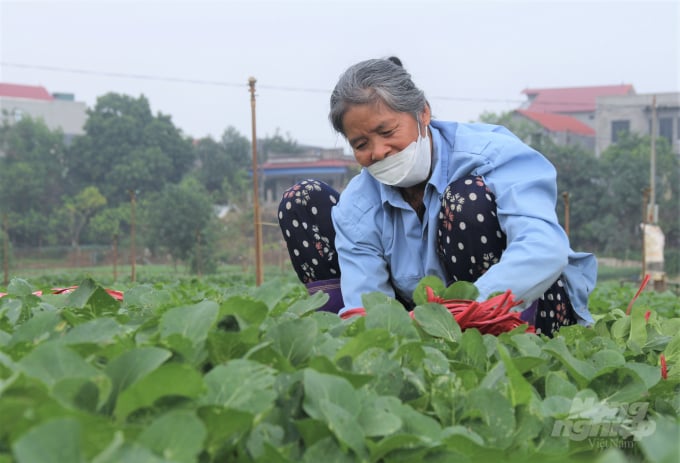
Participating in the project, farmers will get support for production, processing and consumption of farm produce. Photo: Pham Hieu.
Accordingly, with the support from the project, Yen Phu Cooperative has been able to control food safety on a daily basis before transporting vegetables to processing facilities; making production plans to balance production and sales; selecting proper techniques to introduce to farmers.
To bring positive results to Yen Phu cooperative' members in particular and to vegetable growers in Hung Yen province in general, Hung Yen JICA Project Management Board annually organized training classes on basic good agricultural practices (GAP) for the target groups, and at the same time setting up training courses on agricultural and food marketing for the locals.
Especially, Hung Yen JICA Project Management Board guided local people to adopt basic good agricultural practices; introducing effective farming techniques and instructing them how to make production plan based on market demand...
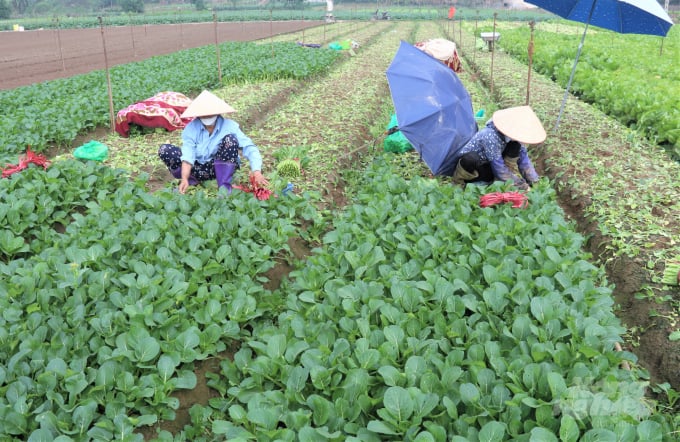
The project helps build production and management capacity for cooperatives. Photo: Pham Hieu.
Thanks to practical solutions, Hung Yen JICA Project Management Board helped local farmers increase the volume of vegetables sold via concentrated sales model. The number of farmers participating in the model increased by 35% and 77% in 2017 and 2020 respectively. Up to 90% of agricultural products were sold through contracts signed with companies, 5% sold via online channels such as Facebook, Zalo and 5% sold directly to traders.
To scale up the model and to spread the impact of the project, Hung Yen JICA Project Management Board has helped farmers in producing safe vegetables, transferring technologies. Besides, the project has helped cooperatives gain VietGAP certificates; providing funding and financing for infrastructures for vegetable production including power lines, automatic irrigation system and greenhouses and building an origin tracing system for the province.
At the conferene, Dang Quang Huy, Representative of the Department of International Cooperation under the Ministry of Agriculture and Rural Development, asked relevant agencies to pay attention to the Project's specific action plan in 2022, and at the same time selecting target cooperatives that are suitable for the project according to the set criteria.
Translated by Mai Tham
/2025/05/25/4127-3-073637_820.jpg)
(VAN) Thanks to the promotion from an FAO-implemented project, vegetable production in greenhouses in Moc Chau has seen strong development, from 1.5 hectares in 2021 to nearly 50 hectares in 2024.

(VAN) FAO has recently supported USD 140,000 to implement the project 'Risk mitigation human-animal interface risks through disease control initiatives in pig farming.'

(VAN) The People's Committee of Tra Vinh province has approved an adjustment to the investment policy for the Green Hydrogen Plant project, increasing its area to approximately 52.76 hectares.
![Reducing emissions from rice fields: [2] Farmers’ commitment to the soil](https://t.ex-cdn.com/nongnghiepmoitruong.vn/608w/files/news/2025/05/05/dsc08881jpg-nongnghiep-140632.jpg)
(VAN) Clean rice cultivation model in Thuong Tan commune, Bac Tan Uyen district, is assisting local residents in achieving sustainable agriculture by substantially reducing costs, increasing productivity, and protecting the environment.

(VAN) At the conference to disseminate Resolution No. 68, AgriS introduced its digital agricultural ecosystem and reaffirmed its commitment to accompanying the Government in promoting private sector development and sustainable agriculture.

(VAN) 'Blue Ocean - Blue Foods' initiative is designed to restore marine ecosystems and establish sustainable livelihoods for local communities by cultivating a minimum of 1,000 hectares of cottonii seaweed in the first three years.
/2025/05/21/4642-3-112707_603.jpg)
(VAN) The V-SCOPE project has made direct contributions to three out of six pillars of the Comprehensive Strategic Partnership between Vietnam and Australia.